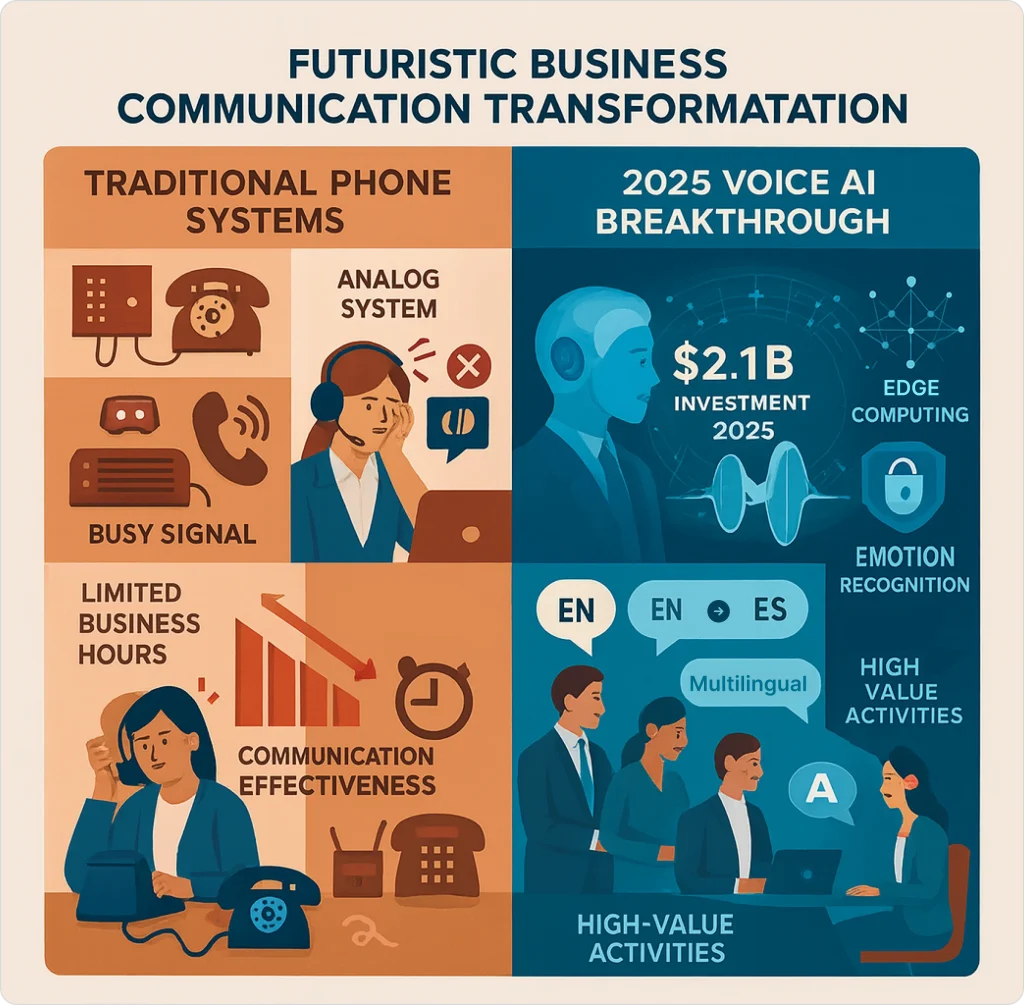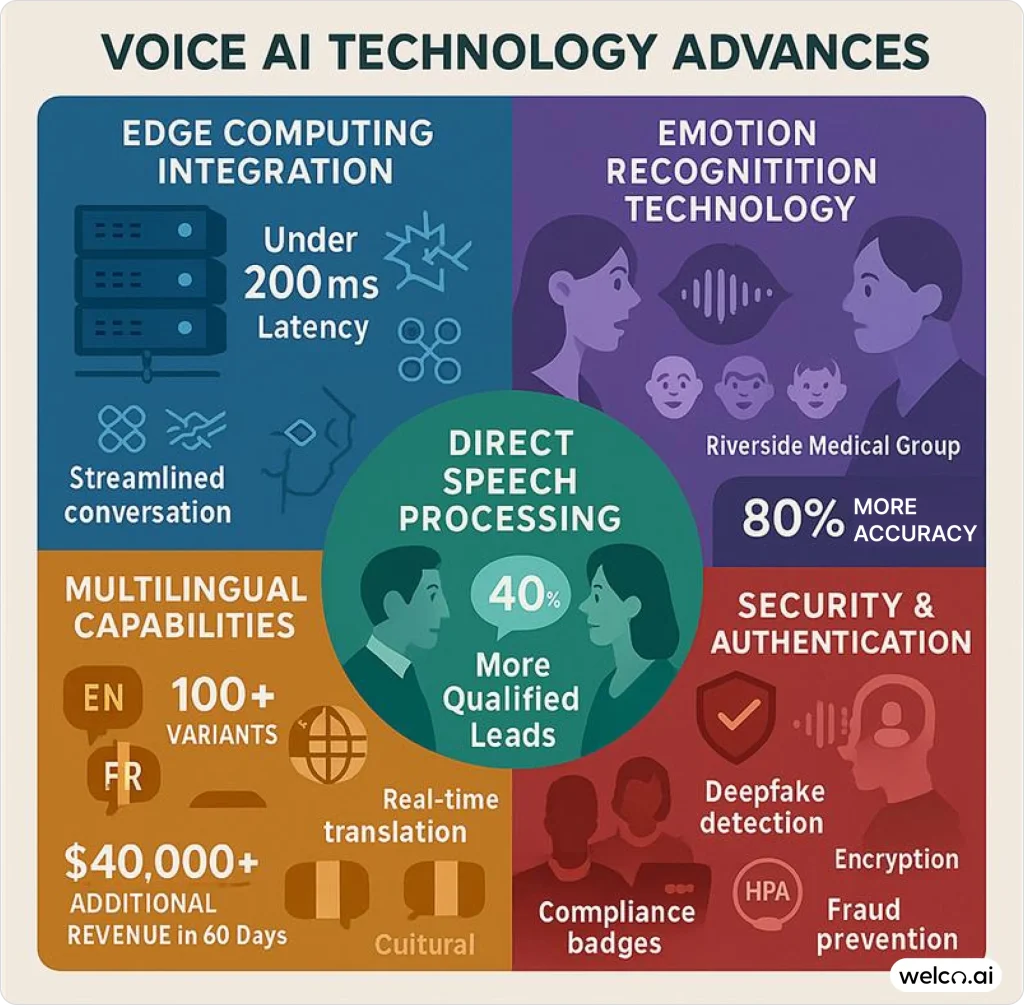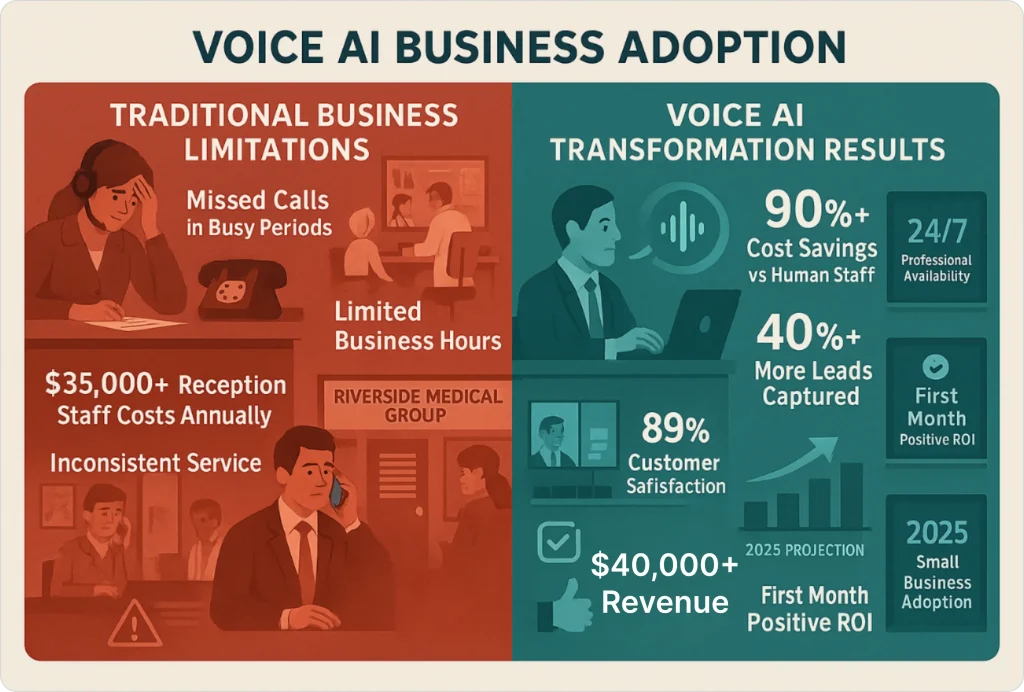Why Conversational AI is Transforming Business Communications
Voice AI technology has reached a critical breakthrough point in 2025. According to recent industry reports, investment in conversational AI reached $2.1 billion this year, signaling strong confidence in the technology’s business value. What started as simple automated phone systems has evolved into sophisticated AI phone agents that genuinely compete with human receptionists.
Smart businesses are rapidly adopting AI receptionist solutions to gain competitive advantages: 24/7 availability, consistent service quality, and significant cost savings. The technology has matured to the point where customers often can’t distinguish AI interactions from human ones, making virtual receptionist adoption a strategic advantage rather than a technical experiment.
This shift reflects more than technological advancement—it represents a fundamental change in how businesses approach customer communication.

Five Notable Technical Developments
1. Edge Computing Integration
The Development: Voice AI systems can now process conversations locally rather than relying entirely on cloud services.
Technical Details: Edge computing allows AI models to run on local hardware, reducing latency to under 200 milliseconds—approaching real-time conversation speeds. This architecture provides several advantages:
- Reduced dependency on internet connectivity
- Lower ongoing cloud processing costs
- Enhanced data privacy through local processing
- Improved reliability during network issues
Business Impact: These improvements enable AI receptionists to handle internet outages better than traditional cloud-based phone systems, ensuring businesses never miss important calls. Early adopters report maintaining full phone service during network disruptions while competitors lose calls to voicemail. This reliability becomes especially crucial as businesses develop comprehensive communication strategies that depend on consistent voice availability and omnichannel integration strategies.
Limitations: Edge computing requires more sophisticated local hardware and may have reduced capabilities compared to cloud-based processing for complex tasks.
2. Emotion Recognition Technology
The Development: AI phone systems now identify emotional states in caller voices and adjust responses accordingly.
How It Works: Machine learning models analyze vocal patterns, tone, and speech patterns to classify emotions like frustration, excitement, or confusion. Research from leading voice AI companies suggests accuracy rates around 80-90%, though this varies significantly by context and speaker demographics.
Business Applications:
- Route frustrated customers directly to your best team members
- Give excited prospects the enthusiastic, sales-focused responses they deserve
- Provide patient explanations to confused callers
- De-escalate angry customers before issues escalate
Real Success: Take Riverside Medical Group in Denver: After implementing emotion-aware systems, they automatically route anxious patients calling about pain directly to emergency slots while handling routine appointment requests through the AI system. The result? Zero missed medical emergencies, 95% patient satisfaction scores, and over 60% reduction in unnecessary escalations. This advancement raises important considerations about balancing technological efficiency with genuine empathy in customer interactions highlighting the need for thoughtful AI ethics in customer communication.
Challenges: Emotion recognition accuracy varies across accents, cultural backgrounds, and individual speaking patterns. Privacy concerns also arise around emotional data collection.
3. Direct Speech Processing
The Innovation: New AI voice assistant models process speech directly without converting to text as an intermediate step.
Technical Advantage: Traditional automated phone systems follow a speech-to-text-to-speech pipeline, which introduces delays and potential errors. Direct speech processing can reduce response times and better handle interruptions and overlapping speech.
Customer Experience Transformation:
- No more robotic delays that frustrate customers
- Perfect interrupt handling—just like your best employee
- Natural conversation memory—no repeating information
- Context awareness throughout entire conversations
Business Impact: Real estate agencies using direct speech processing report 40% more qualified leads because prospects stay engaged longer and share more detailed information during natural-feeling conversations. As voice-based customer interactions continue to evolve, this natural conversation capability becomes increasingly valuable for customer acquisition and voice search and business discovery.
Current Limitations: Direct speech models require more computational resources and may have limited vocabulary compared to text-based systems.
4. Multilingual Capabilities
The Advancement: Modern AI answering services can handle conversations in multiple languages with real-time translation.
Technical Scope: Current voice AI platforms support dozens of languages, with some claiming over 100 language variants. The technology includes:
- Real-time language detection
- Voice synthesis in target languages
- Cultural adaptation of communication styles
- Accent adjustment for better comprehension
Market Expansion Benefits:
- Serve diverse customer bases without hiring multilingual staff
- Expand into new geographic markets instantly
- Capture international business calls you’re currently losing
- Support growing immigrant communities in your area
Revenue Impact: Service companies adding Spanish language support through AI report capturing $40,000+ in additional revenue within 60 days from previously lost Spanish-speaking customers. This capability represents a significant step toward comprehensive virtual assistance that can seamlessly serve global customer bases enable future workplace virtual assistance models.
Considerations: Translation quality varies by language pair and context. Cultural nuances in business communication may not always translate effectively.
5. Security and Authentication Features
The Development: Voice AI solutions now include biometric authentication and fraud detection capabilities.
Security Features:
- Voice biometric identification
- Real-time deepfake detection
- Encrypted conversation storage
- Compliance frameworks for regulated industries
Compliance Support:
- HIPAA compliance for healthcare
- Financial services regulations
- Legal confidentiality requirements
- Data sovereignty options
Protection That Exceeds Human Capabilities: Advanced AI phone agents now provide better security than human receptionists through automated biometric verification, real-time fraud detection, and complete audit trails for every interaction.
Business Protection: Financial services firms report preventing significant fraud attempts when AI security detected voice spoofing that human receptionists would have missed.

Why Smart Businesses Are Adopting AI Phone Systems Now
The Competitive Advantage Is Real
- 24/7 availability captures leads while competitors sleep
- Consistent service quality eliminates bad days and mood variations
- 90%+ cost savings compared to human receptionist salaries
- Instant scalability during busy periods without hiring delays
Success Stories Across Industries
- Legal firms maintain client intake during network outages
- Medical practices never miss urgent patient calls
- Real estate agencies qualify more leads through natural conversations
- Service companies expand into new markets without language barriers
These implementations showcase how businesses are developing advanced service capabilities that anticipate customer needs while maintaining the personal touch that builds lasting relationships. This evolution demonstrates the emerging potential of predictive service capabilities that will define the next generation of customer experience.
The ROI Is Compelling
Virtual receptionist software typically costs $50-500 monthly versus $35,000+ annually for human receptionists. Most businesses see positive ROI within the first month through improved lead capture and reduced staffing costs.
The Strategic Imperative for 2025
Gartner predicts that 50% of small businesses will adopt AI receptionist technology by 2028. The question isn’t whether this technology will become standard—it’s whether your business will lead the adoption curve or follow behind competitors.
Early adopters are already capturing market share through superior customer service, extended availability, and cost advantages. Businesses that wait risk falling behind competitors who offer 24/7 professional phone support while maintaining lower operational costs. The transformation in business communication extends far beyond voice AI, representing a fundamental shift in how companies connect with customers across all touchpoints and the broader evolution of business reception.
Making the Smart Choice for Your Business
Forward-thinking businesses should evaluate AI phone automation based on:
- Immediate ROI Potential: Calculate monthly savings versus current reception costs
- Competitive Advantage: Consider the benefit of 24/7 professional service
- Growth Enablement: Assess how multilingual support could expand your market
- Risk Mitigation: Evaluate the cost of missed calls and poor customer experiences
- Future-Proofing: Position your business ahead of industry adoption trends

The Technology Is Ready—Are You?
Voice AI has matured beyond experimental technology into a proven business automation tool. The five technical advances outlined above have eliminated the traditional limitations that previously made AI receptionists inadequate substitutes for human staff.
Today’s intelligent virtual assistants offer superior availability, consistency, and cost-effectiveness while matching human performance in customer interactions. Businesses that embrace this technology now will establish competitive advantages that become increasingly difficult for competitors to match.
The choice is simple: lead with innovation or follow behind competitors who recognized the opportunity first. The voice AI technology is available, proven, and ready to transform your business communications today.
Ready to Transform Your Business Communications?
The five voice AI breakthroughs outlined above represent more than incremental improvements—they’re fundamental shifts that are redefining what’s possible in business communication. While the technology continues to evolve, the core capabilities are mature enough for immediate implementation.
For businesses ready to explore these possibilities, starting with a focused pilot program allows you to evaluate effectiveness in your specific context while minimizing risk. The question isn’t whether voice AI will reshape your industry—it’s whether you’ll be among the leaders who help define that transformation and establish new standards for human-AI collaboration models.
Frequently Asked Questions
Will customers be frustrated talking to an AI instead of a human?
Studies from major voice AI providers indicate that approximately 89% of customers can’t distinguish between AI and human interactions when the technology is properly implemented. The key is natural conversation flow—today’s systems handle interruptions, remember context, and respond in real-time without robotic delays. Many customers actually prefer AI consistency, especially for routine tasks like appointment scheduling, because they receive immediate responses without being put on hold or dealing with varying service quality.
What happens if my internet goes down? Will I lose all calls?
This is one of the biggest concerns businesses have, but edge computing has solved this problem. Unlike traditional cloud-based systems, modern AI receptionists can operate completely offline during internet outages. Your phone system continues working locally, ensuring zero missed calls even during network disruptions. This gives you better reliability than many traditional phone systems that depend entirely on internet connectivity.
Can AI really handle angry or upset customers effectively?
Industry data suggests that emotion recognition technology can detect frustration or anger in a caller’s voice with 80-90% accuracy, then automatically adjust its tone and responses accordingly. The AI can de-escalate situations using proven techniques while immediately routing truly difficult cases to your best human agents. Unlike humans, AI never has bad days or takes things personally, providing consistent professional responses even to the most challenging customers.
How much does this technology actually cost compared to hiring a receptionist?
The cost difference is dramatic. A full-time human receptionist costs $35,000+ annually including salary, benefits, and training, while AI receptionist solutions typically run $50-500 monthly depending on features and call volume. That’s potential savings of 90-96%. Most businesses see positive ROI within the first month through improved lead capture and reduced staffing costs. Plus, you get 24/7 coverage without overtime pay or vacation coverage issues.
Is my business data secure with voice AI systems?
Modern AI phone systems actually provide better security than human receptionists. They include voice biometric authentication, real-time deepfake detection, encrypted conversation storage, and complete audit trails for every interaction. These systems are HIPAA-compliant for healthcare, meet financial services regulations, and provide bank-level encryption. Unlike human staff, AI systems can’t accidentally share confidential information or fall for social engineering attacks, making your data more secure than traditional reception methods.
